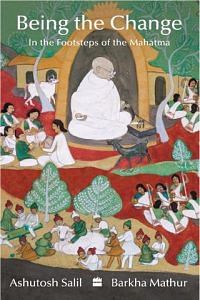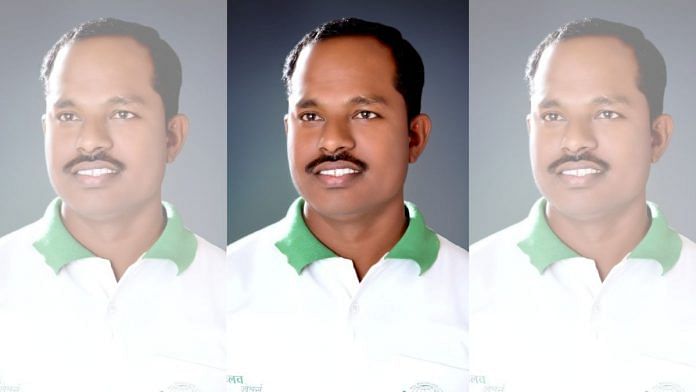When the sun shines on one side, the other side falls under a shadow,’ Bandu says. This is definitely true of his public and private life. Yojana and Bandu’s reality has not changed, even though everyone in the city knows Bandu Dhotre and Eco-Pro. Bandu has succeeded in what he had set out to achieve—be a real-life hero people look up to—but he often feels that he has failed badly as a son, a husband and a father. ‘I wanted to be in the army, and my father, in spite of everything else he did, helped me and supported me financially, as somewhere along the way it had become his dream too. But I could not fulfil it,’ Bandu rues. As he does not have a steady income, his father still supports him. Bandu’s two young sons, Chitraksh and Rudraksh, struggle to reconcile their father’s successful public life with his harsh personal life.
Getting ready for school, they often tell their mother, ‘Baba is the chief guest at an event being organized in school.’ Or sometimes they come home waving the questionnaire of a quiz contest that has questions about Eco-Pro and Bandu Dhotre.
Their faces beam with pride as they tell their mother, ‘Our friends in school look at us in disbelief and are awestruck when we tell them that we are Bandu Dhotre’s sons.’ But Chitraksh and Rudraksh have never enjoyed the simple pleasures of family life, like having ice cream in the summer or going on a picnic in winter. ‘Your father does not have the time and I don’t have the money for such outings,’ their mother explains to them. This leads to angry outbursts. ‘I don’t ever want to be like him,’ the older of the two brothers shouts as his mother looks on helplessly, not finding the right words that can both pacify her son and not damage the respect she knows he has for his father. She confronts Bandu when he comes home. ‘I have no answer when they ask me why their father, who is such a celebrated figure, cannot provide for their requirements,’ Yojana tells her husband. ‘Scrounging up even Rs 100 for their needs is a struggle as I never have any money to spare.’
Bandu admits that he has not been an ideal father. ‘Once I bought the wrong set of textbooks for them. I didn’t even know which class they were in,’ he rues. They had admitted their sons to a neighbourhood school, but the monthly fee of Rs 250 was more than what the family could afford. The boys would have been denied an education if a friend of Bandu’s had not come to know of their predicament. He arranged for a sponsor to fund the boys’ education. Both of Bandu’s sons now study in a public school and their fees are taken care of by benevolent patrons.
Also read: ‘Speed of a cheetah’ — read the subtext. Modi’s ‘pet’ project is heavy with political messaging
This does not bother Bandu. ‘The only way to success is through talent, hard work, and a grasp on life and what to make of it,’ he says. ‘It depends upon the boys—what they make of their lives. If they have the talent and capability, the roads to success will open up for them.’ Yojana’s suffering, however, is something that does hurt Bandu. It makes him feel inadequate and helpless. She, on her part, is constantly torn between pride in her husband’s work and the struggles she goes through for money and his attention.
She is proud of the name and fame that her husband has earned, but frustrated that he doesn’t earn enough to sustain their family. The hurt surfaces as rancour in petty, daily matters. Riding on his bike, she insists that he take a particular route to reach their Bandu Dhotre destination. ‘We will get caught in a traffic jam, as I know that there is a procession coming down that road,’ he explains to her. Adamant that she have her way, she insists that he take the route she wants. He does, and both spend more than half an hour stuck in a jam. ‘I can sense what’s going to happen next. Yojana can’t. She lives in the present and that’s why she suffers,’ is how Bandu sums up their constant friction.
The lofty goals he has set for himself trouble his wife. She constantly tries to strike a balance between giving him the freedom to attain them and her longing to remain relevant in his life. ‘He feels he is born to do great things in life. Being his wife, I can’t come in the way of his achieving them. But as his wife I also have some expectations from him,’ she says.
She also questions whether working so much for society actually does any good; she questions the cost the family has to pay for it. She finds his selfless acts utterly selfish, performed for personal gratification. However, despite all the contradictions that life has heaped upon her, Yojana would not like to change anything. ‘He is a good man,’ she repeats, as if to reassure herself. ‘I want my sons to be like their father and work with Eco-Pro.’ Bandu, however, doesn’t want anybody—neither his sons nor any of his volunteers—to become another Bandu Dhotre. He knows that keeping personal ambition at bay while riding success and fame needs a great deal of moral and mental strength. ‘I am completely involved in my work and have no time for anything else. It is a tough act to follow,’ he warns. He admits that at heart and in his mind he is no better than a sadhu, albeit one with a family.

This excerpt from Ashutosh Salil and Barkha Mathur’s ‘Being the Change: In the Footsteps of the Mahatma’ has been published with permission from Harper Collins India.






